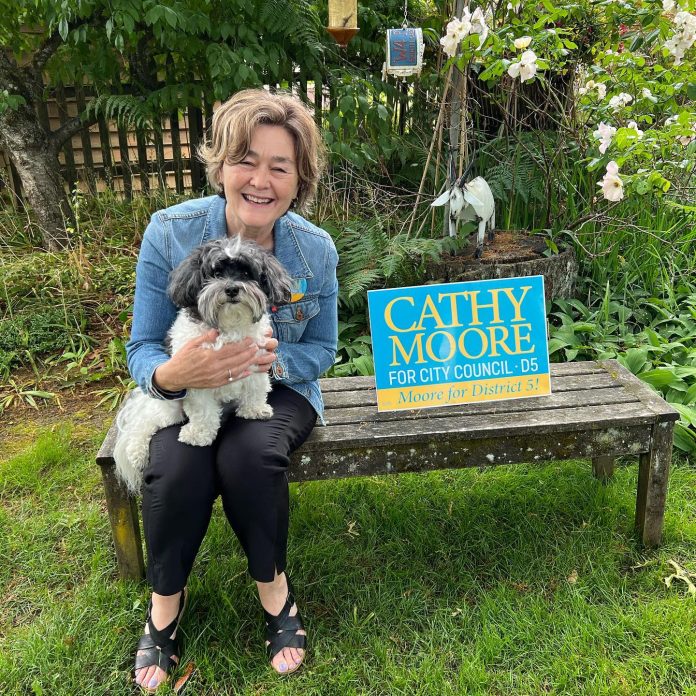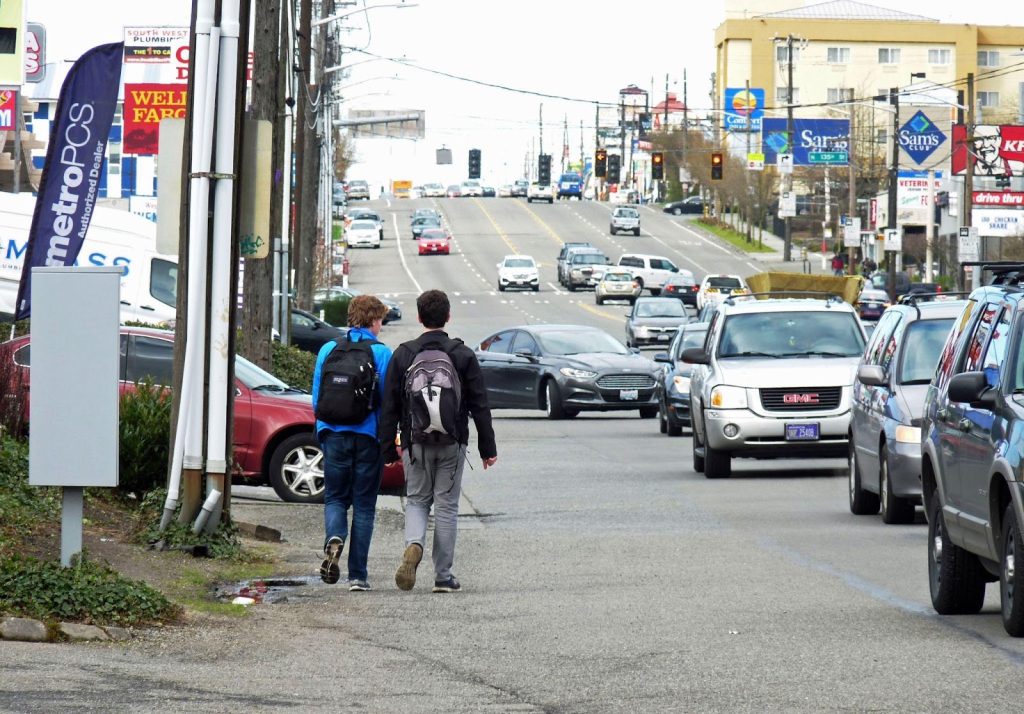
Moore has staked her City Council bid on frontline experience and a balanced lawyerly approach.
With Seattle City Council President Debora Juarez’s retirement, the District 5 council seat is wide open for the taking. Former King County Superior Court judge Cathy Moore is one of the candidates vying for that honor, and she won the endorsement of the Seattle Times Editorial Board, which should increase her odds of making it through the primary.
But is Moore a typical Seattle Times endorsee in the mold of Alex Pedersen or Sara Nelson? In The Urbanist‘s interview with Moore, that’s not the impression she gave, with stronger stances around housing abundance citywide, holding police accountable, and implementing a balanced public safety approach including the addition of a civilianized third safety department. She’s acknowledged there are no quick easy fixes to public safety issues, and her legal career began with a stint working in legal aid and as a public defender rather the traditional political climber glidepath of being a prosecutor.
“I don’t think any of us have a magic bullet to this,” Moore told The Urbanist. “But I definitely think that we need to have a civilian response team. And I think that there’s a lot that could be going on with a civilian response team, that would minimize the need for certain armed police responses, which hopefully would free up the officers that we do have to be able to focus more on when violence is actually occurring, and when the armed response is actually necessary.”
Moore faces off in a crowded field that includes ChrisTiana ObeySumner, who won The Stranger‘s endorsement, Nilu Jenks (who won the nod from The Urbanist Elections Committee and Publicola), and Tye Reed, who has the backing of the Transit Riders Union. Maple Leaf realtor Shane Macomber and Broadview Community Council leader Justin Simmons could also be a factor and survive a crowded primary without clear lanes. District 5 covers the far north of Seattle and its borders changed a bit in redistricting, with the addition of Crown Hill and North Greenwood and loss of Wedgwood.
The Journey to Housing Abundance Advocacy
For Moore, getting to a housing abundance stance was a journey. She gave a nod to the state passage of House Bill 1110 for pushing jurisdictions like Seattle to do more to add housing.
“To be honest, I would say for a while I was really reluctant to consider additional options besides single family housing, and this has been a real journey of education,” Moore told The Urbanist. “And, and so I’ve really moved away from that. And I’ve also been really glad that the state pushed us. So many people were really kind of NIMBYish in this regard. And we weren’t going to make any progress unless the state stepped in. So the passage of 1110 has created the ability for us to do the work that needs to be done.”

Moore referenced her worry that her three kids wouldn’t be able to afford to stay in the city they were raised in due to rapidly rising housing costs. Given that, her journey has brought her toward a preference for Alternative 5, which adds the most housing capacity among the options currently in consideration for the Seattle Comprehensive Plan Major Update — and some curiosity to add Alternative 6, which goes even further, to the study.
“The last article that I read was The Urbanist article about various options. At that point, it seemed like Alternative 5 was the one that had the most variety and integration and scale to it. But, you know, now people have been talking about an Alternative 6. And I certainly think that we ought to include the Alternative 6 in the comp plan for study. So I’m not in a position to say yay or nay, I don’t know enough. But I think five and six are certainly where I would be leaning.”
Moore said she voted for Initiative I-135 and would take steps to support the public development authority as it scales up and tries to begin delivering social housing.
“It’s a really interesting idea, and I’m excited to see how it’s going to play out,” Moore said of the public developer. “And again, Councilmember Morales is leading the charge on that. I certainly would be very supportive of that. I mentioned the Oak Tree Plaza — that’s public — Seattle might be able to broker some sort of leasing arrangement with Seattle Public Schools for the public development authority to put housing in there. So yeah, I’m very supportive; we’ve got to try as many different things as possible.”
The Journey to Criminalizing Drugs
While her journey has led Moore in a more progressive direction on housing, she appears to have moved in a more conservative direction on drug policy. In May, Moore told The Urbanist that criminalizing public drug use and using jail to try to force people into treatment was not the answer, but by the time the Downtown Seattle Association (DSA) questionnaire came around, she was singing a different tune that ultimately earned her an “Aligned” rating from the DSA.
“First, pass an ordinance conforming city law to state law to allow police to arrest individuals for public drug use and drug possession,” she wrote in that questionnaire.
Meanwhile Moore told The Urbanist in May: “I’m not entirely sure that we actually have the authority as a municipality to criminalize the public use of illegal substances. It’s state law now… the state has preempted the city in those regards. But even if we had that authority, I don’t think criminalizing public use is the way to go. I think that we need to, again, we need to utilize the outreach community. There’s this idea that we need to have a hammer and that the hammer is to get people into treatment and to get them into jail and then divert them. So some of the diversion is working very well. And that is one way to get people into treatment. But we could also utilize the non-armed civilian responders, to get people to agree to go to the detox center. We have a detox center. We have a treatment center. Let’s work on establishing relationships and getting people to voluntarily go to those centers.”
In her interview with The Urbanist, Moore acknowledged that housing and services were needed to get a handle on homelessness, drugs, and crime, and that pilot programs to get civilian emergency response up and running must get launched as soon as possible.
“The most critical piece is we’ve got to have services and we have to have housing. We have all these social workers and people that are making those relationships and connections. But if we don’t have the services to help people get into, we don’t have shelter or housing to put people into, we’re not going to make any progress. So those all go hand in hand. I know that Councilmember Herbold and Lewis have really been pushing and they put aside $1.9 million for a pilot project to do the wellness checks and man down. And I don’t really understand why that hasn’t been done — we can do it. Now. Today. We’ve got the people, we just need to do it.”
Conceivably those new services and housing options will take additional revenue, especially as the city appears to have a significant budget shortfall even before expanding programs, but it’s a tightrope Moore is walking on progressive revenue and tax reform.
Moore told the DSA that she agreed that the “City should prioritize existing spending before imposing new taxes or increasing existing ones” and that the city would seek a business and operations (B&O) tax break (as requested by the DSA and the Seattle Metropolitan Chamber of Commerce in their recovery plan) to boost economic recovery.
However, she also told the DSA she would follow the recommendations of the City’s Progressive Revenue Task Force, which will soon be offering its recommendations on new taxes to implement to close the budget shortfall and fund future priorities. In her Urbanist questionnaire, she was was more forthcoming with a list of progressive revenue sources she’d support implementing, including a 1% City income tax, high-end CEO pay, and increasing the real estate excise tax.
Sidewalks, protected bike lanes, and the streetcar
Moore indicated she’d be outspoken on street safety issues, saying the City needs to follow through on the Vision Zero campaign to end traffic deaths by 2030 and contending District 5 needs a similar safe streets champion as Councilmember Tammy Morales has been in South Seattle.
“We’re going to have to prioritize the building of sidewalks because they’re so incredibly expensive,” Moore said. “But we need to be putting them in areas like over at Lake City, around schools, where there’s a particularly high need for pedestrian safety, largely because we’re around a lot of car traffic. So it’s a lot about environmental design. I mean, looking at Aurora, so much of it is about ending left turns through pedestrian crossings. I’m really glad to see that the city is now ending right on reds and many places, reducing speed limits. I’m a big fan of those signs that tell you how fast you’re going. I think those are really effective. Creating more barriers, like actual physical barriers that would separate traffic from pedestrians and bikes, creating more overpasses along 130th up there. There’s a pedestrian bridge, but there are not enough pedestrian bridges, and it’s incredibly unsafe. So I think the city just needs to follow through with the recommendations of Vision Zero. Councilmember Morales has really become the leader and the voice for that, particularly in her District 2, and District 5 needs a comparable activist voice.”

In her support for the Center City Streetcar, Moore pointed out there the irony of the criticism that the streetcar was just a “shopping shuttle” — which was the argument of Councilmember Lisa Herbold, a strident opponent of the streetcar.
“It just seems a missed opportunity to not be able to connect those two and sort of create a transit modality around the downtown area,” Moore said. “And I think it would also be incredibly helpful in the revitalization of downtown if you’ve made it easier for people to get around. I know Councilmember Herbold has been a strong opponent of it. And I’m not entirely sure, as I said, I’m still learning the details as to why it’s seen as sort of a shopping thing. But I mean, shopping is part of what people do downtown, and if we can increase the arts options, the cultural options, the educational options downtown, it would be really great to have that, that [street]car there.”
Police accountability and getting the contract right
Moore lamented that police accountability measures had been bargained away in the City’s 2018 police contract with the Seattle Police Officers Guild (SPOG). She pointed to the need to undo the next police contract, which is currently being negotiated, and empower the Office of Police Accountability (OPA) and Office of the Inspector General (OIG) to hold the Seattle Police Department (SPD) accountability.
“When I chaired the Seattle Human Rights Commission, we were at the point where we’re beginning to implement the consent decree and the creation of the Community Police Commission, the OPA, and OIG,” Moore said. “My concern at that time, and it has remained, is police accountability. And the Council in 2017 passed a remarkable police accountability ordinance. Unfortunately, most of the provisions were bargained away.”
Moore highlighted that the police management union had agreed to ratchet up those accountability measures in its recent contract. Today, the broad latitude offered in the last SPOG contract mean that police officers are often able to appeal disciplinary findings and wiggle out of punishment or overturn their firings. The new contract with the Seattle Police Management Association addresses that problem, but will need to be echoed in the new SPOG contract to take effect broadly.
“So the conditions are that we’ve lowered the burden of proof to uphold disciplinary decisions if the [police] chief took preponderance of the evidence… They also agreed that a disciplinary decision could only be overturned if it was determined to be arbitrary and capricious,” Moore said. “Maintaining subpoena power for OPA and OIG is also incredibly important, allowing there’s a 180-day deadline for when investigations have to be done, making sure that there are sufficient exceptions to that for discovery of new information.”
Moore hoped that the new management contract could be a model for the contract with the rank-and-file.
“But at a minimum, the other conditions that the management has agreed to need to be in a SPOG contract. And the other piece that’s also really important is [the third public safety entity] — and this is what I think has held up to some extent the move forward by the Harrell administration… Under collective bargaining, those are considered your job duty and considered a term and condition of employment. And those are all subject to bargaining. And I think that we need to get SPOG to agree that they would not seek to bargain the creation, the movement of responsibilities from them to a civilian response force, that we’re not going to have to bargain every single relinquishment or transfer of responsibility. So that’s going to be a tough sell, I’m sure, but that is something that we need.”
Looking ahead
Ballots are out and voters have until August 1 to return them and have their say in the primary. The D5 race is up for grabs, and time will tell if endorsements from organizations like the Seattle Times will be enough to carry the day for Moore.
As to her final case for election, Moore pointed to her distinguished career in law and public service, which also included chairing the Seattle Human Rights Commission and a stint as interim City clerk.
“Well, I think what I bring to the table is a lifelong commitment to public service,” Moore said. “I mean, I’ve been on the ground doing the coalface frontline work from the beginning. I’ve worked with people in crisis. I’ve worked with vulnerable people with vulnerable communities. I’ve seen the interplay between the legal system and the social service system and the mental health system, and how complex and complicated that is, there are really no easy answers to a lot of those questions. I have seen the unintended consequences of the law. I have a legal knowledge about what is and isn’t possible.”
Doug Trumm is publisher of The Urbanist. An Urbanist writer since 2015, he dreams of pedestrian streets, bus lanes, and a mass-timber building spree to end our housing crisis. He graduated from the Evans School of Public Policy and Governance at the University of Washington in 2019. He lives in Seattle's Fremont neighborhood and loves to explore the city by foot and by bike.


